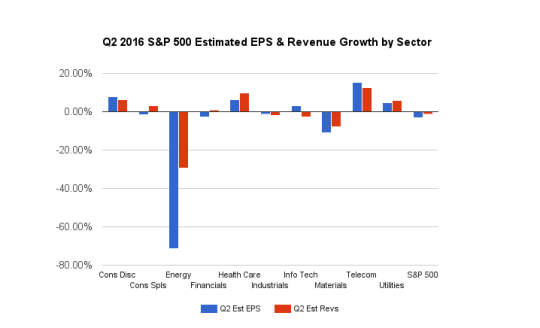The second-quarter earnings season unofficially kicked off in it’s normal fashion Monday with results from Alcoa (NYSE:AA). Each season tends to have a unique crop of culprits that are held responsible for subduing bottom-line results. Some of these issues recur for several quarters, but this season it’s out with the old, and in with the new.
So Long, Strong Dollar and Low Oil Concerns
For much 2015 and even the first quarter of 2016, it was lower oil prices and a strong US dollar that many S&P 500 corporations blamed for missed expectations. Falling oil prices were no doubt a big detractor for the energy sector, which saw year-over-year profit growth bottom out at -122% for Q1 2016. While lower prices at the pump were beneficial for a variety of other sectors, it was not enough to offset weakness in energy, materials and financials.
The stronger US dollar has been mentioned for about six quarters now, since it initially began to creep up in the fall of 2014. It’s no surprise that this was an issue, as about 50% of S&P 500 revenues come from abroad and the repatriation of those sales back to the US dollar undercuts profits.
Hello, Brexit and Higher Wages
Now that the dollar has stabilized, and oil is back above the $50 threshold, some new issues are taking center stage, specifically Brexit and higher labor costs.
Nearly 3 weeks ago the UK voted to leave the EU. Global markets reacted negatively to the news with financials and oil taking the brunt of the beating while gold made significant gains. Uncertainty surrounding the future of Great Britain and Europe, and the fear of recession there, also sent corporate fundamental expectations downward. Many of the agreements will need to be renegotiated in a way that doesn’t send Britain into recession but also doesn’t push the disintegration of the European Union.
This of course impacts US multinationals that count on a large chunk of revenues from Europe, including eBay (NASDAQ:EBAY), JPMorgan (NYSE:JPM), Ford (NYSE:F), Gap (NYSE:GPS) and Xerox (NYSE:XRX), among others, that will suffer from the impacts of unfavorable currency exchange rates. Of the 14 S&P 500 companies that have reported since the Brexit vote took place, only Carnival (NYSE:CCL) and McCormick (NYSE:MKC) have explicitly mentioned the negative toll it will take on their businesses. All told, around 10% of S&P 500 revenues come from Europe.
Another big trend to watch in 2016 is how higher wages will impact companies’ bottom-lines. Increases come by way of employers that have voluntarily chosen to increase salaries and states that are boosting minimum wages.
This trend started in earnest with Wal-Mart (NYSE:WMT) in February of 2015 when the world’s largest retailer announced that it was raising entry wages to $9 an hour, and that by February 2016 all employees would earn at least $10/hour. Manager roles were raised to $13, and then to at least $15 an hour earlier this year. While the move was great for the company’s smeared public image, it’s one that will cost $2.7B by the end of the year. In order to compete, other big box retailers felt the pressure to follow suit, including TJX (NYSE:TJX), Target (NYSE:TGT), Costco (NASDAQ:COST) and McDonald’s (NYSE:MCD). This has pressured margins, which have fallen to their lowest levels since 2009. Even the banks are getting involved, with JPMorgan Chase just announcing that it will hike wages for 18,000 low-ranking, hourly employees over the next three years.
While jobs numbers have continually improved since the end of the great recession in 2009, wage growth is one metric that has remained stagnant. The average hourly wage growth figure in the US has not surpassed more than a 0.77% increase on a month-over-month basis in the first half of this year. In June, wages increased 2.6% from the year ago period, a marked improvement from prior months, but still lower than the average of 3% before the recession and no where near the pace it should be at this point in the recovery. But those slight improvements are leading to a situation in which labor costs are now outpacing business output prices, further compressing margins.
Negative Profits Expected to Persist for the 5th Consecutive Quarter
In response to these emerging concerns, estimates for Q2 have continually been ratcheted down for many large multinational corporations. The S&P 500 is currently expected to show a YoY EPS decline of 3% and revenues of -1.1%. This would be the fifth consecutive decline on the bottom-line, marking the first time the index has recorded five consecutive profit declines since during the recession when 9 consecutive quarter were recorded (Q7 2008 - Q3 2009). Revenues are in for their sixth consecutive decline, more than during the recession when 5 consecutive declines were recorded form Q3 2008 - Q3 2009.

The expected leaders and laggards for Q2 are a familiar bunch. Telecom leads once again, and is the only sector expecting double digit growth for profits and revenues, of 15.1% and 12.4%, respectively. Consumer Discretionary takes second place, thanks to strength from internet retail, household durables and autos. Bringing up the rear is once again energy and materials, both expected to post losses for another quarter.
The outlook for the second half of the year does look brighter, with Estimize contributors expecting both top and bottom-line growth to return. However, those numbers have been coming down in recent weeks, as analysts are uncertain with what the macro environment will look like in Q3 and Q4.
How do you think this earnings season will turn out?
